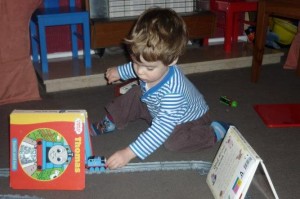When our firstborn was a 20 month old toddler, his favorite sentence was, “By my own self!” That’s not really a sentence, since there’s no subject or verb, but we all knew the subject was “Nelson” and the verb was “do!” He desperately wanted to be independent.
Two weeks ago when I was in England visiting my 3 young grandchildren, the twins evidenced that same indomitable spirit at 22 months saying, “Own! Own! Own!”
I looked at their mommy and said, “What does that mean?”
“They want to do it ‘on their own’,” she said.
If I began peeling an orange for Evelyn, she’d reach for it and shout, “Own! Own!” Or with Thomas, I’d start to set up a train track and he’d say the same. “Own!”
Every child has their uniique way of communicating the same message: “Me have it!” or “I wanna do it!” or just plain “Nooo!”
As soon as children have minimal vocabulary, what they most want to say with it is, “I’m independent!” They’re letting us know they don’t want or need any help.
We laugh at that since most of the things they’re trying to do are beyond their toddler capabilities. But don’t we adults often communicate the very same message to God? We know he wants us to humble ourselves and come to him for help, but first choice is always to do it “by my own self.” When we finally admit we need him, our request still comes out wrong: “Lord, help me to do such and such.”
Instead it ought to be, “Do whatever you want, Lord, and I’ll follow.”
We live in a world that idolizes self-rule, which is one reason why following Jesus is so unpopular. The backbone of Christianity is complete dependency on God, and the Bible’s steady drumbeat is, “Lose yourself in Christ’s sufficiency, and your life will have purpose.”
Making Christianity even less appealing to the masses, Scripture tells us our present life is only a training ground for life after death. We’re supposed to accept the old adage, “You can’t take it with you,” focusing away from earthly accumulation and toward heavenly treasure.
So how do we squelch the inner voice that begins talking to us at 20 months and never quits? How do we escape the natural human drive toward independence?
The only possible way is to admit that everything we do, have, or are belongs to God. That includes our homes and everything in them, our degrees, careers, accolades, investments, cars, our bodies and facial appearance, our health, our freedoms, even our children and grandchildren. All are God’s.
And once we acknowledge that, the rest comes easy, because if everything belongs to him, it’s only natural to follow his instructions on what to do with it all. As for doing anything “on our own” after that?
Not a chance.
“Anyone who loves their life will lose it, while anyone who hates their life in this world will keep it for eternal life.” (John 12:25)








